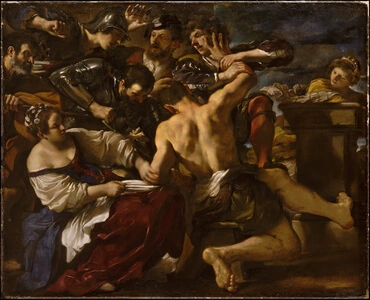1
La parole qui fut adressée à Jérémie de la part de l'Eternel, après que Nebuzaradan, chef des gardes, l'eut renvoyé de Rama. Quand il le fit chercher, Jérémie était lié de chaînes parmi tous les captifs de Jérusalem et de Juda qu'on emmenait à Babylone.
2
Le chef des gardes envoya chercher Jérémie, et lui dit: L'Eternel, ton Dieu, a annoncé ces malheurs contre ce lieu;
3
l'Eternel a fait venir et a exécuté ce qu'il avait dit, et ces choses vous sont arrivées parce que vous avez péché contre l'Eternel et que vous n'avez pas écouté sa voix.
4
Maintenant voici, je te délivre aujourd'hui des chaînes que tu as aux mains; si tu veux venir avec moi à Babylone, viens, j'aurai soin de toi; si cela te déplaît de venir avec moi à Babylone, ne viens pas; regarde, tout le pays est devant toi, va où il te semblera bon et convenable d'aller.
5
Et comme il tardait à répondre: Retourne, ajouta-t-il, vers Guedalia, fils d'Achikam, fils de Schaphan, que le roi de Babylone a établi sur les villes de Juda, et reste avec lui parmi le peuple; ou bien, va partout où il te conviendra d'aller. Le chef des gardes lui donna des vivres et des présents, et le congédia.
6
Jérémie alla vers Guedalia, fils d'Achikam, à Mitspa, et il resta avec lui parmi le peuple qui était demeuré dans le pays.
7
Lorsque tous les chefs des troupes qui étaient dans les campagnes eurent appris, eux et leurs hommes, que le roi de Babylone avait établi gouverneur du pays Guedalia, fils d'Achikam, et qu'il lui avait confié les hommes, les femmes, les enfants, et ceux des pauvres du pays qu'on n'avait pas emmenés captifs à Babylone,
8
ils se rendirent auprès de Guedalia à Mitspa, savoir Ismaël, fils de Nethania, Jochanan et Jonathan, fils de Karéach, Seraja, fils de Thanhumeth, les fils d'Ephaï de Nethopha, et Jezania, fils du Maacatite, eux et leurs hommes.
9
Guedalia, fils d'Achikam, fils de Schaphan, leur jura, à eux et à leurs hommes, en disant: Ne craignez pas de servir les Chaldéens; demeurez dans le pays, servez le roi de Babylone, et vous vous en trouverez bien.
10
Voici, je reste à Mitspa, pour être présent devant les Chaldéens qui viendront vers nous; et vous, faites la récolte du vin, des fruits d'été et de l'huile, mettez-les dans vos vases, et demeurez dans vos villes que vous occupez.
11
Tous les Juifs qui étaient au pays de Moab, chez les Ammonites, au pays d'Edom, et dans tous les pays, apprirent que le roi de Babylone avait laissé un reste dans Juda, et qu'il leur avait donné pour gouverneur Guedalia, fils d'Achikam, fils de Schaphan.
12
Et tous les Juifs revinrent de tous les lieux où ils étaient dispersés, ils se rendirent dans le pays de Juda vers Guedalia à Mitspa, et ils firent une abondante récolte de vin et de fruits d'été.
13
Jochanan, fils de Karéach, et tous les chefs des troupes qui étaient dans les campagnes, vinrent auprès de Guedalia à Mitspa,
14
et lui dirent: Sais-tu que Baalis, roi des Ammonites, a chargé Ismaël, fils de Nethania, de t'ôter la vie? Mais Guedalia, fils d'Achikam, ne les crut point.
15
Et Jochanan, fils de Karéach, dit secrètement à Guedalia à Mitspa: Permets que j'aille tuer Ismaël, fils de Nethania. Personne ne le saura. Pourquoi t'ôterait-il la vie? pourquoi tous ceux de Juda rassemblés auprès de toi se disperseraient-ils, et le reste de Juda périrait-il?
16
Guedalia, fils d'Achikam, répondit à Jochanan, fils de Karéach: Ne fais pas cela; car ce que tu dis sur Ismaël est faux.







